Essay On Coffee
Outlines of Essay
- Introduction
- Health Benefits of Coffee
- Negative Effects of Coffee
- The Culture of Coffee
- The Economic & Environmental Impact of Coffee
- Ethical issues in the coffee industry
Introduction
Coffee is a popular beverage made from roasted coffee beans, which are the seeds of the coffee plant. The drink has a long and rich history, dating back to the 15th century when it was first discovered in Ethiopia. From there, it spread to the Middle East and eventually made its way to Europe and the rest of the world. Today, coffee is enjoyed by people all over the globe and is a staple in many cultures. It is often consumed in the morning to help people wake up and start their day, but it is also enjoyed throughout the day as a pick-me-up or a social drink. Coffee is also used as an ingredient in many other products, such as desserts and beauty products.
Health Benefits of Coffee
Coffee has a variety of health benefits. Here are some of the most significant health benefits of coffee. Coffee contains caffeine, which is a natural stimulant that can help to improve mental alertness, focus, and concentration. Studies have shown that caffeine can enhance cognitive function and improve mood. Regular coffee consumption has been linked to a reduced risk of developing Alzheimer’s and Parkinson’s disease. The caffeine in coffee may help to protect the brain against these neurodegenerative disorders. Coffee consumption has been associated with a lower risk of developing type 2 diabetes.
This may be because coffee contains compounds that help to regulate blood sugar levels and improve insulin sensitivity. The caffeine in coffee can also help to improve physical performance by increasing energy levels and reducing fatigue. This is why many athletes use caffeine as a performance-enhancing drug.
Coffee consumption has been linked to a lower risk of liver disease, including liver cancer and cirrhosis. This may be because coffee contains compounds that help to protect the liver from damage. Studies have shown that people who drink coffee regularly have a lower risk of developing depression. This may be because coffee contains compounds that help to regulate mood.
Some studies have suggested that moderate coffee consumption may be associated with a lower risk of heart disease. This may be because coffee contains compounds that help to reduce inflammation and improve blood vessel function.
Negative Effects of Coffee
While coffee can have many benefits, there are also some negative effects associated with its consumption. Here are some of the negative effects of coffee.
Coffee is a stimulant that can interfere with sleep. Consuming coffee late in the day can make it difficult to fall asleep and stay asleep, leading to insomnia. Coffee can increase levels of the stress hormone cortisol, which can lead to feelings of anxiety and jitters. This effect is more pronounced in people who are sensitive to caffeine. Coffee can irritate the lining of the stomach and increase acid production, leading to digestive issues such as acid reflux, bloating, and diarrhea.
Coffee is a diuretic, which means it can increase urine production and lead to dehydration if not consumed in moderation. Regular consumption of coffee can lead to addiction and withdrawal symptoms such as headaches, fatigue, and irritability if consumption is suddenly stopped. Coffee can interfere with absorbing some nutrients, such as calcium, iron, and zinc.
The Culture of Coffee
The culture of coffee varies depending on the region and the customs of the people who consume it. In some countries, such as Italy, coffee is an integral part of daily life and social interaction, with cafés serving as popular gathering places. In other regions, such as the United States, coffee is often consumed on the go as people rush to work or appointments.
In many cultures, coffee is associated with specific rituals and traditions. For example, in some Middle Eastern countries, serving coffee to guests is a sign of hospitality and respect. In Ethiopia, a traditional coffee ceremony is a social event that can last for hours, with coffee being brewed and served ceremonially.
Coffee has also influenced the way people work and collaborate. In many workplaces, coffee breaks are a common way for employees to take a break, recharge, and socialize with coworkers. Some companies even have their in-house coffee shops to provide employees with easy access to their favourite brews.
The culture of coffee has also given rise to a variety of different brewing methods and styles. From the French press to the pour-over to the espresso machine, coffee enthusiasts have developed many ways to create the perfect cup of coffee. This has led to a growing interest in specialty coffee, with coffee lovers seeking out unique blends and single-origin beans from around the world.
The culture of coffee is a dynamic and ever-evolving phenomenon that reflects the diverse customs and traditions of people worldwide. Whether enjoyed alone or in the company of others, coffee has become an integral part of modern life and a symbol of connection and community.
The Economic & Environmental Impact of Coffee
Coffee has a significant economic and environmental impact, both locally and globally. Here are some key points.
Coffee is a major source of employment for millions of people around the world, particularly in developing countries. It is estimated that over 25 million farmers and their families depend on coffee for their livelihoods. Coffee is one of the world’s most valuable traded commodities, with the global coffee market estimated at over $100 billion. Coffee production and export is a major source of revenue for many countries. Coffee is a significant item in global trade, with many countries relying on coffee exports to balance their trade accounts. Coffee shops and cafes have become a thriving business around the world, creating employment opportunities for thousands of people.
Coffee production often leads to deforestation, particularly in areas with high biodiversity. Forests are cleared to make way for coffee plantations, which can have a devastating impact on local ecosystems. Coffee production is a water-intensive process, with large amounts of water required to grow, process, and transport coffee beans. Coffee is often grown using pesticides, which can have negative impacts on local ecosystems and can be harmful to workers and consumers.
The coffee industry generates significant amounts of waste, including used coffee grounds, packaging materials, and processing byproducts. The transportation and roasting of coffee beans generate significant greenhouse gas emissions, contributing to climate change.
Ethical issues in the coffee industry
The coffee industry is one of the largest and most important agricultural sectors in the world, but it is also a sector that has faced several ethical challenges. Some of the major ethical issues in the coffee industry include:
Coffee is often produced in developing countries where labour laws are weak or poorly enforced, and workers may be subject to low wages, long hours, and unsafe working conditions. Many coffee producers are small-scale farmers who struggle to get fair prices for their coffee and may be subject to unfair trading practices by larger companies. There have been reports of child labour in the coffee industry, with children working long hours on farms and missing out on education and other opportunities. Women are often underrepresented in the coffee industry and may face discrimination and unequal pay.
The price of coffee can fluctuate wildly due to market forces, leaving coffee producers vulnerable to economic shocks. Large coffee companies have been criticized for their social and environmental practices, and for their role in perpetuating some of the ethical issues in the industry.
FAQ’s
What are the different types of coffee?
There are many different types of coffee, including espresso, cappuccino, latte, americano, and many others.
How is coffee made?
Coffee is made by grinding roasted coffee beans and then brewing them with hot water. There are many different methods for brewing coffee, including drip brewing, French press, and espresso.
What is decaf coffee?
Decaf coffee is coffee that has had most of its caffeine removed. It is a good option for people who are sensitive to caffeine or who want to limit their caffeine intake.
Download Pdf of Essay On Coffee

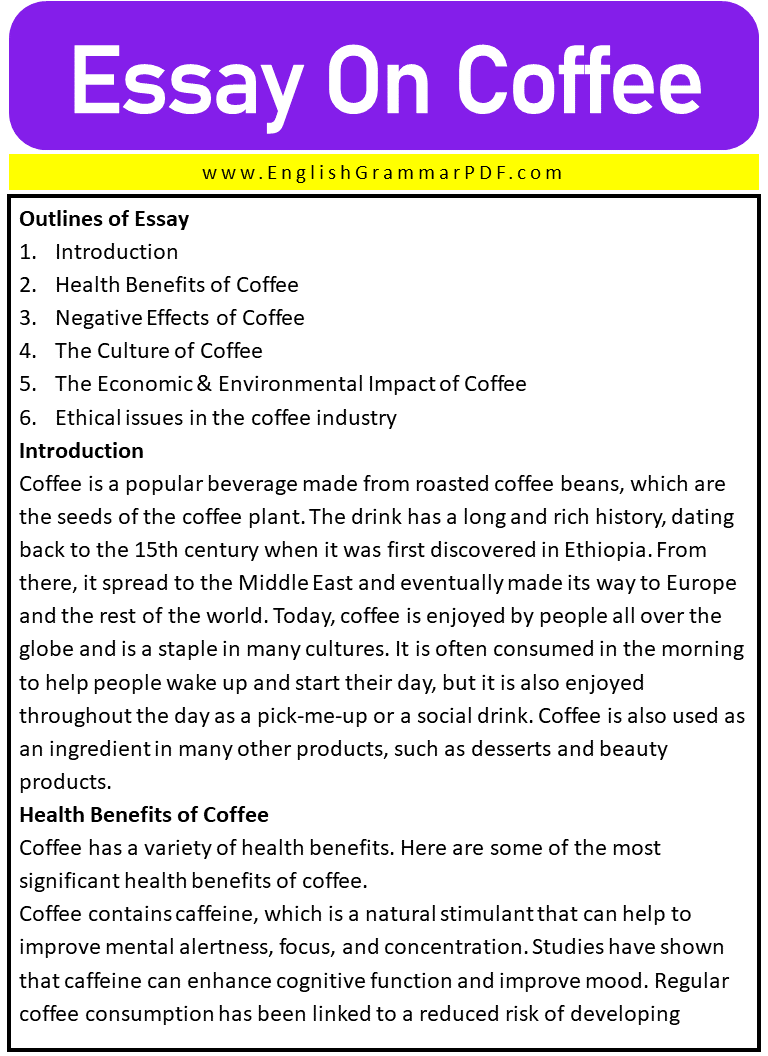
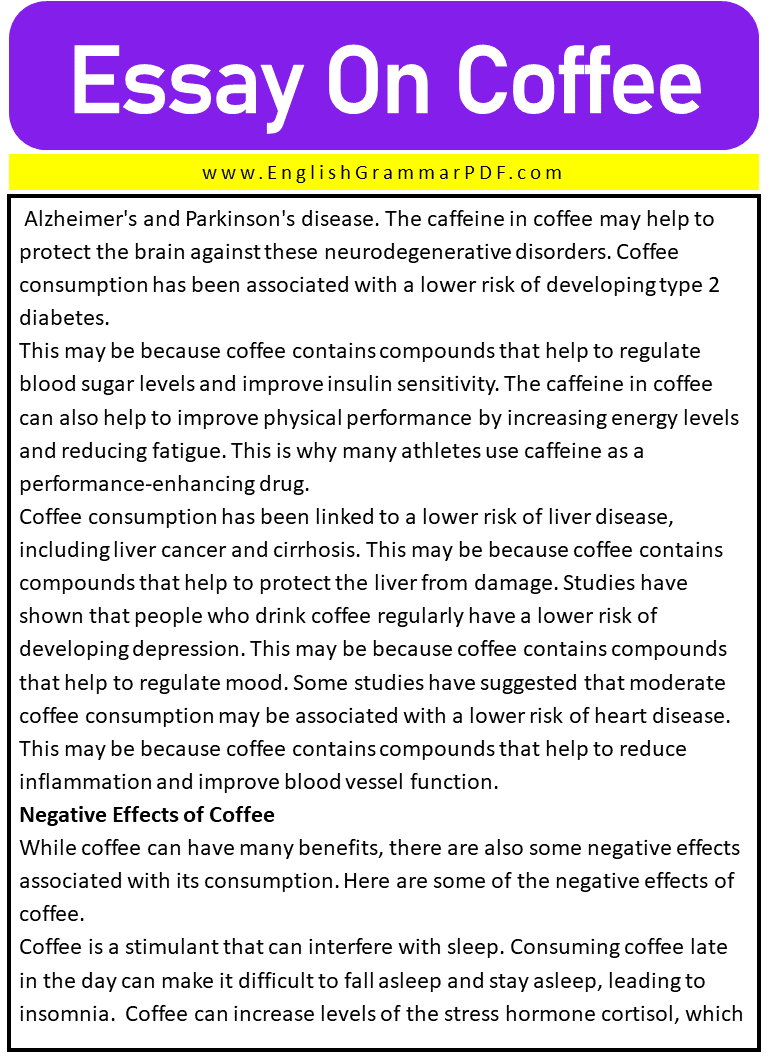
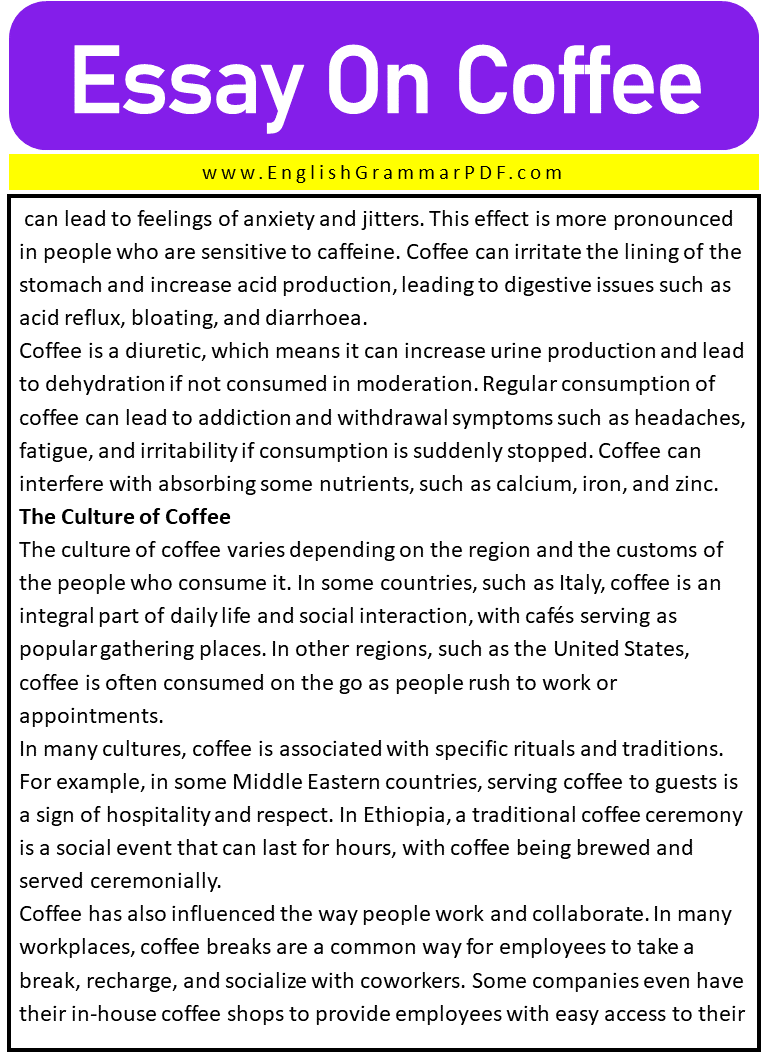
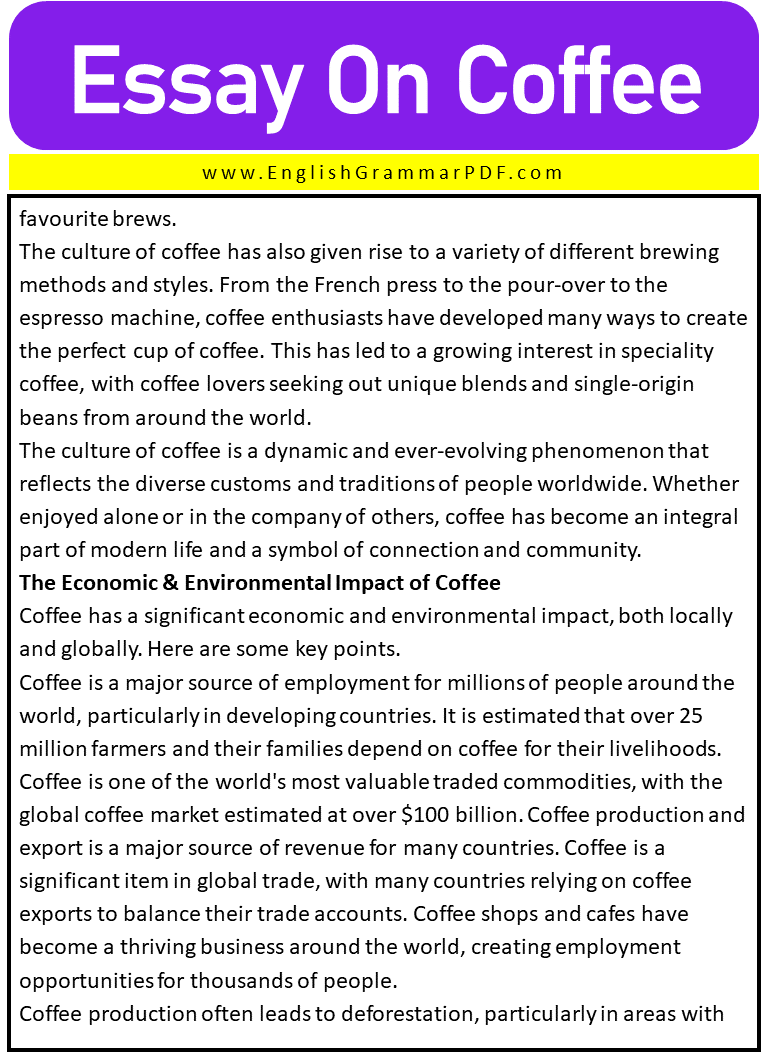
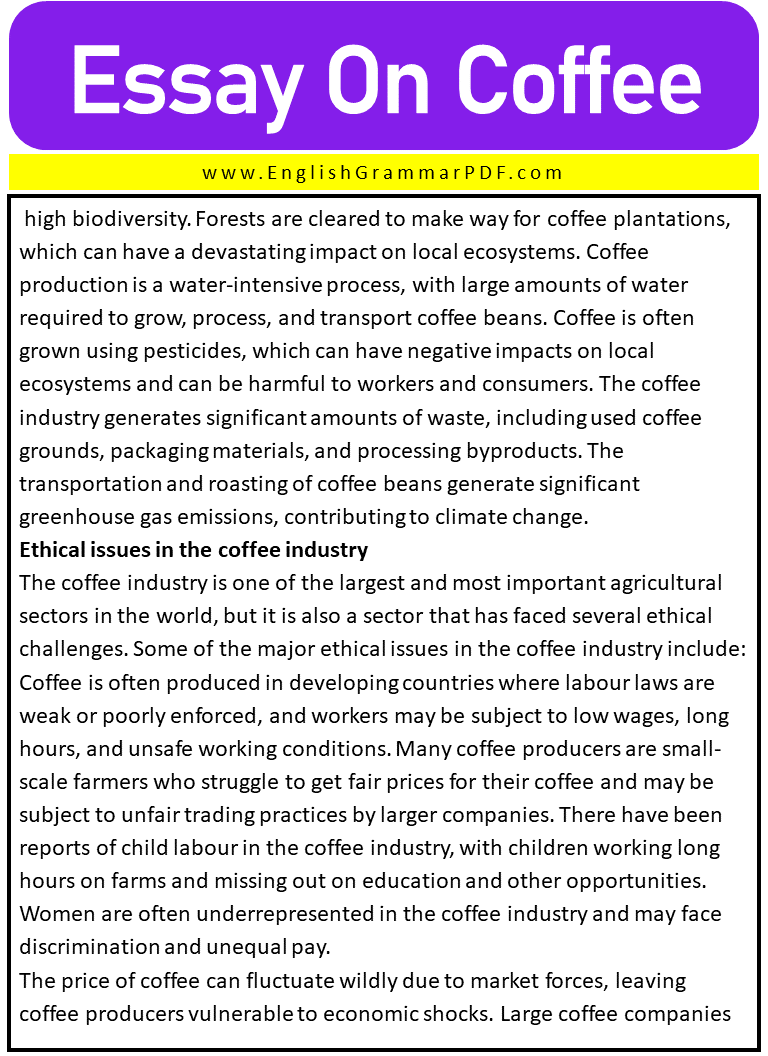

More Essays:


